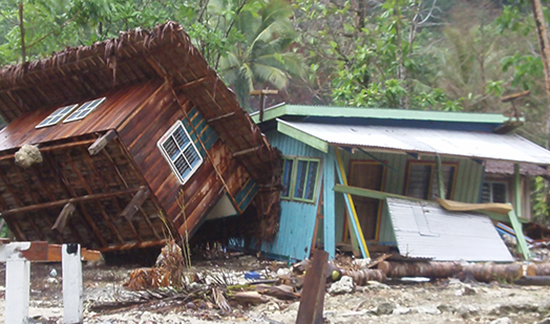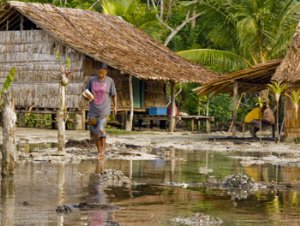
The economic impacts of the flood disaster in the Solomon Islands will soon be felt in the country’s coffers, and the social and psychological effects will loom in the collective memories for many years to come, writes Dr Tarcisius Tara Kabutaulaka.
ANALYSIS: The loss of lives and properties from last week’s flash floods in Solomon Islands is heartbreaking.
The economic impacts will soon be felt in the country’s coffers, and the social and psychological effects will loom in our collective memories for many years to come.
This is an added burden on a country still struggling to clamber out of the negative impacts of the civil unrests nearly 15 years ago.
Those who are old enough will also remember the devastations of cyclone Namu in 1986, and more recently, the tsunamis of 2007 and 2013.
 As I write this article, the search continues for those still missing, while relatives crowd the small morgue at the National Referral Hospital in Honiara to identify and take away the bodies of loved ones.
As I write this article, the search continues for those still missing, while relatives crowd the small morgue at the National Referral Hospital in Honiara to identify and take away the bodies of loved ones.
This is a calamity Honiara has never seen before.
Devastation reports
The clean up has began. But, it will take days before the extent of the devastation is fully known as assessments are done and reports come in from the greater north Guadalcanal, the part of the country most affected.
While the stories about the loss of life and the destruction of private properties and public infrastructure are important, and must be told, I am interested in another story: the politicisation of this disaster.
This is a story that lurks in the murky waters of election politics, as the country prepares for national elections later this year.
It is a story about the potential for intending candidates and sitting members of Parliament (MPs) to exploit people’s vulnerabilities and sufferings to score political points and harness advantage for the upcoming elections.
Already, there are claims in the numerous social media networks that some intending candidates have visited evacuation centers around Honiara and provided assistance only to those they think will vote for them in the upcoming elections.
Twist of events
In the meantime there is another interesting twist of events. Late last week, Cabinet approved the release of SI$15 million. This will be distributed to the MPs; SI$300,000 to each of the 50 MPs.
On Monday morning, amid media reports and public concerns, the Prime Minister, Gordon Darcy Lilo, clarified in Parliament that the SI$15 million was
“the first tranche of what is called the Constituency Development Funds for 2014 to enable Members meet the needs of their people who are faced with the situation here in town . . . I therefore want the public not to unnecessarily use such information to create states of confusion here in town as we go through this difficult time.”
This is partial payment of a discretionary fund that Solomon Islands MPs are entitled to.
Lilo also told Parliament that “relief assistance is a matter for the National Disaster Council (NDC).”
In the meantime, the Minister for Environment, Climate Change and Disaster Management, Bradley Tovosia, told Parliament on Monday that the government has allocated what he referred to as “Contingency Warrant of $15 million purposely for the disaster”.
There are, however, concerns about whether in releasing this money the government complied with the Constituency Development Fund Act, and followed acquittal procedures.
In addition, RCDF funds were released at a time when a lot of people are vulnerable and politicians could use it primarily to entice support for the upcoming elections.
Bureaucratic concern
Further, the recent floods did not affect all the constituencies, causing people to wonder why all the MPs need the money now. Perhaps the rationale is that people from all constituencies reside in Honiara, and are therefore affected.
There is also a long-term bureaucratic concern. The release of the RCDF could politicise the delivery of disaster relief, which would adversely affect the coordination of assistance and potentially confuse and affect the role of the NDC and the National Disaster Management Office (NDMO).
Any coordination of disaster relief should be done by the National Disaster Council (NDC), which was established and mandated by the National Disaster Council Act (1989). According to the Act, the National Disaster Council’s function include:
- to provide and render advice to the Minister on all matters relating to disaster;
- to approve and co-ordinate all activities necessary in regard to preparedness, response, and recovery;
- to assume full and complete control in operations connected with disaster; and
- to provide and render financial assistance to committees.
Consequently, putting money in the hands of politicians will likely hurt, rather than help disaster relief.
The development of the last couple of days has left many people wondering why the government chose to allocate three times more money to MPs at a time of national disaster when the NDC would seem like the one that needs it most.
But, the prime minister has a rather feeble explanation. He told Parliament on Monday morning that “. . . the NDMO is a very bureaucratic institution and always does things not quite to the satisfaction of people.”
Weakened institutions
This leaves one wondering whether politicians have done things “better” and therefore deserving to receive and distribute SI$15 million in disaster relief. I suspect the answer is a resounding “no”.
It also highlights concerns that this and successive Solomon Islands governments has progressively weakened state institutions legally mandated to administer state affairs, by taking away trust and resources and allocating them to politicians. This has left many public servants disillusioned.
The relationship between disaster relief funds and politics is not new. In 1986, the then Prime Minister, Sir Peter Kenilorea, resigned amidst allegations that he channeled French aid for cyclone Namu relief to rebuild his village. Although this was never proven, Sir Peter had the good sense to resign and let somebody else take over the leadership reigns.
Gordon Darcy has also had his share of disaster relief controversies. There are still murmurings that, as Minister of Fiance, he misappropriated millions of dollars of tsunami relief funds donated to help victims of the 2007 tsunami in the Western Solomons.
Whether or not Lilo used this money to pay for political support or feather his own nest will perhaps never be known because the report of the enquiry into this saga was never released.
It should be noted that corruption and disaster relief is not unique to Solomon Islands. You find it elsewhere as well.
In February 2014, for example, Ray Negan, the former Mayor of New Orleans, Louisiana, in the U.S., was convicted and sentenced to twenty years in prison for fraud, bribery and money laundering related to reconstructions following Hurricane Katrina disaster in 2005.
Cautious control
We must therefore be cautious about putting lots of money in the hands of politicians during times of disaster. They have proven that their control of disaster relief funds has, in the past, become disastrous.
Where there is natural disaster, there are vulnerable people, and there is usually money. In such situations, politician prowl like sharks ready to pounce on a struggling tuna.
In the case of Solomon Islands, the waters are particularly murky because of the upcoming elections.
If we are not carefully, the victims of last week’s flash floods will be left stranded on someone’s political agendas.
But, as heartbreaking and devastating as it is, positive things could come out of last week’s flash floods.
Nature has a way of making us rethink what we do, and how we do them. For example, this is perhaps an opportunity to clean the Mataniko River, to build new and better infrastructure, re-evaluate and strengthen institutions responsible for disasters responses, relook at our systems for approving building developments in Honiara, and rethinking the role of politicians.
For now, let us rally as a nation, carry those who suffered most, and rise above the muddy waters and debris the floods left behind. Let us prove our resilience as a people.



